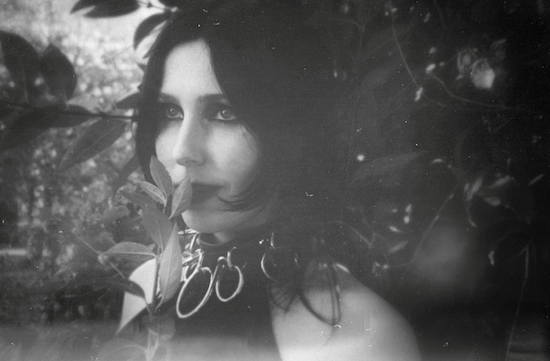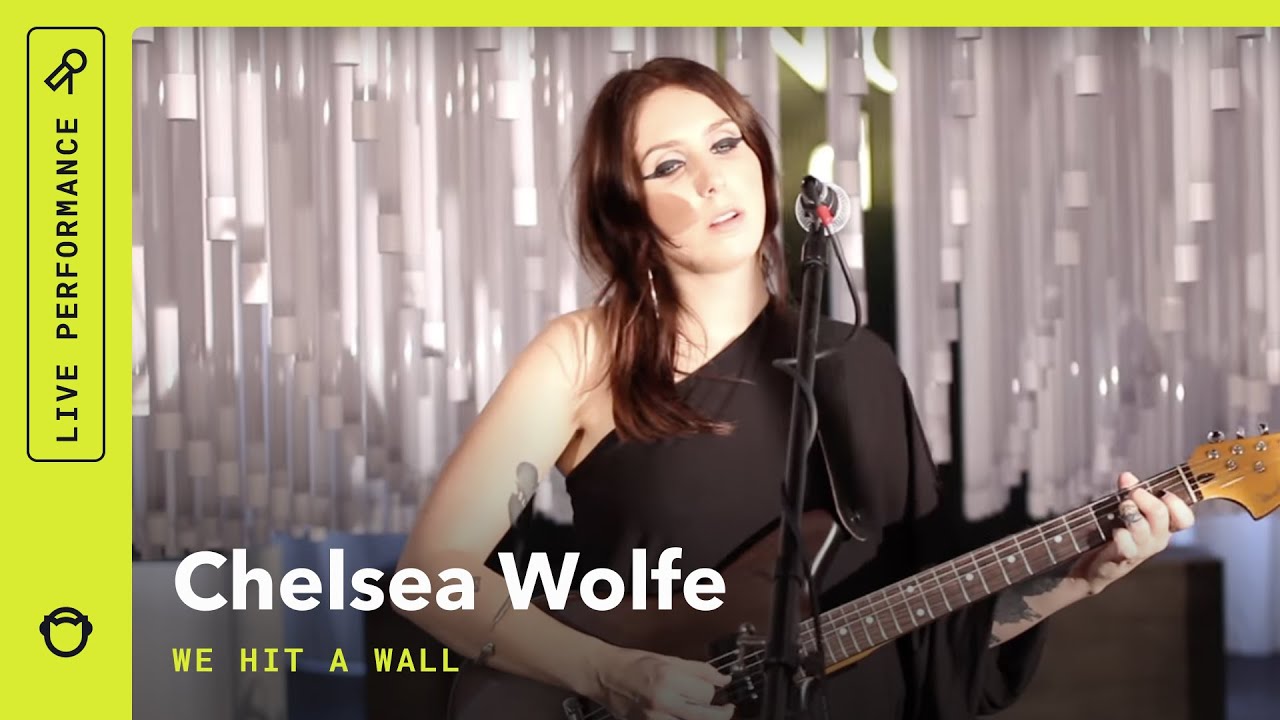Photograph courtesy of Krist Mort
Chelsea Wolfe says that she doesn’t write about personal experiences in her music. She doesn’t like to put certain aspects of herself out there. All of that is well and good, but when you are a journalist trying to pry the deeper meanings behind her choices out of her, it can feel like pulling teeth. In person she is imposing in stature but withdrawn in her relationship to the media. She clearly doesn’t enjoy talking about herself – her answers often include the phrase “I won’t talk about…” – and really it’s a very endearing quality in a person. But the end result is that it is very hard to really know Chelsea Wolfe from a simple interview. On the other hand, obscuring herself has always been a key part of her image, and according to her, it’s something she’s been trying to change, at least in the physical sense. On the cover of her latest album, she stands with her face in a more natural and uncovered way than ever before.
For the past few months, Wolfe has been touring in support of her fourth and most heavily synthesised album yet, Pain Is Beauty, with the UK being her latest stop. She says that the European audiences are “harder to read” than those in her native America, where she is more accustomed to seeing fans sing along with her lyrics, indicating that they have listened to the new record. However, what I saw at her performance at Camden’s Electric Ballroom was an audience entranced, large and still. Whether or not they were singing along, from where I was standing it looked like the new material was having an impressive effect.
Over the last few years she has been writing with Ben Chisholm, who plays keyboards in her band, and perhaps the heavy electronic tilt to the album can be attributed to him. The sounds are crushing at times and airy at others, but there is always a lingering darkness that permeates the material. Wolfe’s love of reverb and space also brings a certain wistfulness that juxtaposes well with the intermittent crunching of electronics, then mixes beautifully with the delicate recessions of noise. All in all, it’s quite a departure from her previous album Unknown Rooms: A Collection of Acoustic Songs, but still doesn’t skimp on the soft and simple sides.
It’s a very electrical album, and a big difference from your acoustic last one. Was it important for you to have that contrast?
Chelsea Wolfe: Things happen really out of order for me to be honest. I was writing some of these electronic songs even before I released the acoustic album so it’s not so much that I’m doing one thing after another, it’s more about what I’m feeling at the time. When I was putting the acoustic album together I was kind of culling songs from over the years and writing a few new ones – a similar process to this one as well, taking a few songs from a few years ago and writing new ones. For me, making an album is more about finding the right songs that fit together and come together in a theme and concept, even if they sound a little different.
I’ve read reviews of Pain Is Beauty that describe the atmosphere as "suffocating" – how do you feel about that?
CW: To me it actually feels really open. I was really inspired by intense nature and landscapes, and I’m always inspired by open spaces and giving room for things to grow sound-wise and visually. I have a bit of claustrophobia myself which I think translates into my music. So I wouldn’t describe it as suffocating to be honest. To me there are a lot of songs on the album that have a sense of forward motion. I’ve always been inspired by trains and chugging forward and trying to overcome something. So for me it has that vibe, it has that forward motion, running, driving towards something.
I’d love to know more about the landscapes you move through on the album. Some use space and others are very dense. If it was a road trip, can you tell me what the journey would look like?
CW: Well, I was definitely focusing on the intensity and the darkness of nature. One of the first songs I wrote for the album came to me after I had seen footage of the earthquake and tsunami in Japan – just that massive overtaking – and watching documentaries of the people who experienced that loss and the sadness that they felt. ‘The Waves Have Come’ came from that. And after that I began to be inspired by the intensity in nature like volcanic lava and forest fires and that regenerative process that comes from forest fires and the way it reflects on humanity.
Is it important for everything that you do to have specific meaning behind it?
CW: I don’t know. I think that what I do is pretty instinctual. I prefer not to overthink things because I think if I did I would never end up releasing anything. I tend to just follow my instincts when it comes to imagery or whatever is inspiring me. I just fit it together in a weird way, and I have to let it go at some point or else I would hold onto it forever.
What are the emotions that you feel personally when listening back to the album?
CW: Well there are definitely a lot of elements of tormented love. It’s about a sense of overcoming and healing and the constant hardships that life brings our way and love brings our way, and if we overcome that we can come out the other side with a more beautiful perspective on life and a greater strength.
You’ve said that the songs were inspired by literature like 1984, as well as the Japan tsunami. How much is your writing from personal experience and how much draws from external sources? Do you feel that it has leaned from one side to the other throughout your career?
CW: The way that I write sounds like it comes from personal experience, but I don’t really like writing about my personal life, so it tends to be about somebody else or coming from outside, like from a documentary or a movie or a novel or from stories that other people tell me. The song ‘The Warden’ ended up being like an alternate ending to 1984 because I found it so frustrating that after this whole struggle and this love story that he gave up the name of his love when he was being tortured. I wrote about the other end of that, a more idealistic ending where he fought till the death to save the one he loves.
What does it say about you as an artist that you don’t want to bring in any of your own experiences? Many artists are just the opposite.
CW: When I first started trying to get out there and make music – I’ve pretty much been writing songs and playing music my whole life but I never imagined doing it as a career or anything – when I was in my early 20s there were people in my hometown who encouraged me to make an album with the songs I was playing around in coffee shops and stuff. I didn’t really feel ready, but then I got caught up in this wave of recording and interviews, and I was really uncomfortable with all the fame. Most of the songs on that were very personal and about relationships and in my mind I felt very petty and I just wasn’t happy with it so I just trashed the album and didn’t do music for a long time after that. I felt like I wanted the first thing that I released into the world to be something that I was really proud of, so I took a step back for a while. And once I re-approached music I had to do it in a way that wasn’t so personal for me to feel comfortable releasing it into the world. Well, of course some of them are, but I would never talk in an interview about exactly what a song is about. I like to keep my music and my life separate.
What sort of effect do you think growing up next to a cemetery had on your creative development?
CW: I was always really interested in the reality of things – the two sides to every story – and I always had a darker perspective on things. Even as a kid I would watch the world news for hours just to get a sense of what was going on in the world. Then we moved into this house where, just beyond the backyard, behind the fence, was a big cemetery. The funerals that would happen right behind my house were Indian funerals. There would be a lot of chanting and a lot of wailing and I would peek through the fence and watch it when I was in middle school. So I don’t know if it directly had an impact on me or if it was just something that inspired me without me knowing it. But that sense of mourning and the way that they express it probably inspired me. The first album that I released, The Grime And The Glow, definitely had a sense of mourning for the world. Physically and image-wise it was trying to portray some sense of a funeral march.
The red dress on the cover of the album is apparently representing molten lava – how did that come about?
CW: I knew that I wanted that to be reflected in the colour, you know, the colour is just so inspiring. I also wanted the album cover to finally show my face and be reflective of my struggles with stage fright and trying to overcome being able to perform when it isn’t something that comes very natural to me. So on the album cover there is a spotlight and my face is showing but I’m also sort of holding myself, a kind of uncomfortable feeling. I used to wear a veil over my face because I wanted to be invisible when I was on stage, but now I’ve started dressing up and getting into fashion and using it to become that character that feels comfortable.
Does your fascination with death still come across or is it more about the tormented love and healing? What are your thoughts on death?
CW: I’ve always had some sort of affinity for the ends of things and thinking about the ends of things. It depends on the song, I try to explore it in different ways. Sometimes when I think about death I’m thinking of it as a physical character that can teach you things and sometimes I’m thinking of it in a finite sense and other times I’m just asking questions that I can’t answer. I don’t really like to state my personal belief, because I change my mind too often, but I imagine something peaceful. Whether it’s a rest or another world or some kind of eternity, it doesn’t seem like a scary thing.
Do you have a favourite cultural or other external source’s version of death?
I wouldn’t say I have a favourite, but I would say that I have experienced things before in very beautiful areas of nature. When I was in Hawaii once, I took a hike up to a big cliff that overlooks these green hills and the ocean. It was in the winter time and everything was green and lush and I could just imagine then what a peaceful thing it must be to die and become a part of nature.



